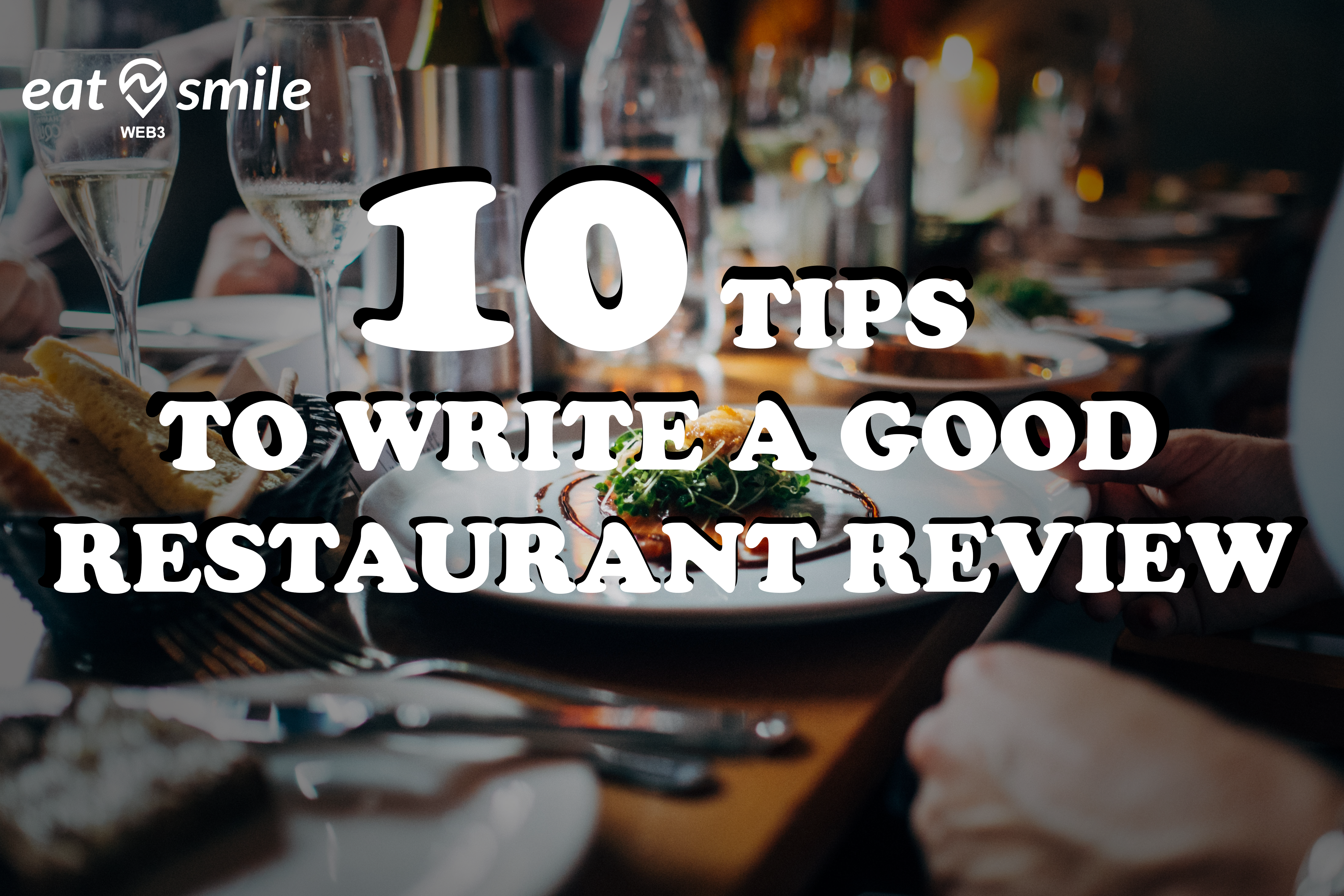
How to Write an Excellent Restaurant Review
If you love food and writing, reviewing restaurants can be a rewarding hobby or even a career. But how do you write an informative, entertaining, and fair restaurant review?
Here are 10 suggestions that EatnSmile has for you. By using these tips, you’ll be able to create a solid restaurant review that will educate and amuse your readers while also showcasing your writing abilities.
10 Tips on How to Write an Excellent Restaurant Review
1. Do your research.
Find out some fundamental details about a restaurant, such as its address, menu, costs, operating hours, and history, before writing a restaurant review. To get a sense of what to anticipate, you can also read internet reviews written by critics or other consumers. This might help you think of some questions or interesting aspects to cover in your restaurant review.
2. Be objective.
You shouldn’t let your biases or personal preferences color your evaluation of a restaurant while writing a review. Try to assess the establishment in light of its own standards and objectives rather than yours. Don’t, for instance, complain that the cuisine at a Thai restaurant is too spicy if you don’t enjoy spicy food. Comment on the food’s balance and seasoning instead.

3. Be descriptive.
The reader should be able to visualize the dining experience in an excellent restaurant review. To describe the cuisine, the service, the ambiance, and the overall impression, use sensory details and concrete examples. Terms like “delicious,” “nice,” or “good” should be avoided. Instead, use adjectives like “succulent,” “cozy,” or “disappointing” to express your feelings and ideas.
4. Be honest.
An excellent restaurant review ought to be factual and accurate as well. Avoid embellishing or lying about your experience, whether it was pleasant or negative. Don’t invent specifics or exaggerate your narrative; just let people know if the food was awful or the server was impolite. Similar to this, if you had a terrific time or a memorable meal, express your gratitude, but don’t exaggerate it. In your evaluation, be impartial and fair.
5. Be respectful.
Respect for both the readers and the restaurant’s personnel and owners is another important quality of a good restaurant review. Even if you had a negative encounter, refrain from using rude or insensitive language. Keep in mind that operating a restaurant requires a lot of labor and that every customer has unique tastes and preferences. Never presume that you are more knowledgeable than experts or that your viewpoint is the only one that matters. Be respectful and modest in your tone.
6. Be concise.
Additionally, a good restaurant review ought to be brief and understandable. Write concisely; avoid babbling or reiterating yourself. Use transitions to link your paragraphs while maintaining concise, straightforward sentences. If you’re writing a full review, keep your word count to around 1000 words, or less if you’re writing for a magazine or website with a small amount of space.

7. Be original.
A quality restaurant review should also be unique and imaginative. Don’t copy or plagiarize content from websites, menus, or other reviews. To express your ideas and emotions, use your own words and mannerisms. As long as it is suitable and pertinent, don’t be scared to inject some comedy or personality into your writing.
8. Be helpful.
A good restaurant review should also be beneficial to readers who are looking for information or suggestions about where to eat. Include useful information in your review, such as the restaurant’s address, phone number, website, and operating hours. You can also indicate the costs, serving sizes, available bookings, and parking alternatives. Give some advice or recommendations on what to have or what to avoid at the restaurant.
9. Be timely.
A quality restaurant review ought to be timely and pertinent as well. Don’t review a restaurant that has subsequently closed, had its name changed, or had its menu altered. When your recollection is still clear and correct after your visit, try to write and publish your evaluation as soon as you can.
10. Be professional.
A fair restaurant review should also be respectful of journalism’s standards of professionalism and decency. Avoid taking complimentary food or gifts from the restaurant in return for a favorable evaluation. Don’t review a restaurant where the person or owners are people with whom you are acquainted on a personal or business level. Don’t review a restaurant where you haven’t had a meal or haven’t paid for it.

Ending words
I sincerely hope you found my blog post on writing restaurant reviews to be interesting. Writing a review is a good approach to develop your writing abilities and critical thinking skills as well as a chance to share your thoughts and experiences with others.
Honesty, information, balance, and engagement are all qualities of a good review. It should also adhere to a few fundamental rules, like using clear, succinct language, including pertinent data and examples, avoiding prejudices or personal attacks, and delivering constructive criticism. You can create a review that will be valuable to and well-liked by the readers as well as the restaurant owners by paying attention to the advice in this article. Good writing until we meet again!
You can also learn how to write a fantastic food review in our blog post “How to Write a Remarkable Food Review.”



